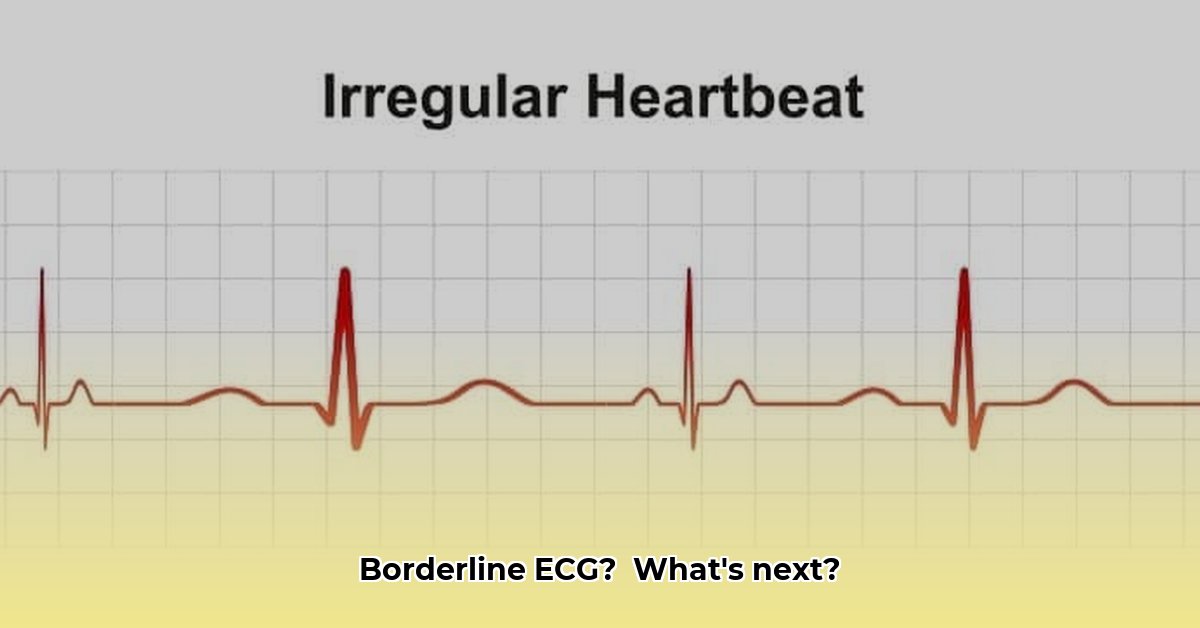Have you received a “borderline” ECG result and feeling anxious? It’s completely understandable. This article provides a clear, concise guide to help you understand what a borderline ECG means, its potential causes, and the steps you should take next.
Decoding a “Borderline” ECG
A “borderline” electrocardiogram (ECG or EKG) result can be unsettling. It signifies that your heart’s electrical activity isn’t entirely textbook normal, but it doesn’t necessarily indicate a serious problem. It simply suggests further investigation may be needed.
Why Might an ECG Be Borderline?
Several factors can contribute to a borderline ECG reading. Some are benign and related to lifestyle, while others may suggest underlying conditions that require further evaluation.
Common Causes of Borderline ECG Results
- Lifestyle Factors: Stress, caffeine intake, nicotine use, dehydration, lack of sleep, and certain medications can influence heart rhythm and lead to borderline ECG readings. These factors can usually be managed with lifestyle changes, and your doctor can provide guidance.
- Electrolyte Imbalances: Electrolytes like potassium, magnesium, and calcium are essential for maintaining a healthy heart rhythm. Even slight imbalances can manifest as borderline ECG findings. These imbalances are usually correctable with appropriate medical intervention.
- Benign Heart Rhythm Variations: Some individuals naturally have slight variations in their heart’s electrical activity. This is often harmless and does not require treatment, but it’s essential to differentiate it from potentially more serious conditions. Conditions such as sinus arrhythmia (a normal variation in heart rate with breathing) or premature atrial contractions (PACs, or extra heartbeats), are often benign.
- Underlying Heart Conditions: While less common, a borderline ECG may suggest a developing heart condition, such as a minor arrhythmia (irregular心跳). This is a possibility that needs further investigation to confirm or rule out.
- Technical Factors: Sometimes, factors like incorrect electrode placement or slight body movements during the ECG can also affect the results, leading to a borderline reading. A repeat EKG can often clarify the situation.
Understanding Your ECG Report
An ECG provides a snapshot of your heart’s electrical activity. Phrases like “sinus rhythm with borderline ECG” or “unconfirmed borderline ECG” indicate that your doctor noticed something slightly unusual but needs more information to interpret it definitively.
A typical ECG tracing shows peaks and valleys, representing the heart’s electrical activity. A borderline ECG might show:
- Slightly different peak or valley heights: Variations that aren’t drastic but noticeable enough to warrant a second look.
- Minor variations in the spacing between waves: These subtle differences can be meaningful and provide clues for further investigation.
What to Do After a Borderline ECG Result
If you receive a borderline ECG result, these are the steps you should take:
-
Seek Immediate Medical Attention if Experiencing Symptoms: If you have symptoms like chest pain, shortness of breath, dizziness, or palpitations (a feeling of a racing or fluttering heart), seek immediate medical attention. These symptoms combined with a borderline ECG could indicate a more urgent issue.
-
Schedule a Doctor’s Visit (Even Without Symptoms): Even without symptoms, it’s crucial to discuss a borderline ECG result with your doctor. They can assess your overall health, medical history, and the ECG to determine the appropriate next steps.
-
Prepare Questions for Your Doctor: Before your appointment, prepare a list of questions. This will help you make the most of your visit and address all your concerns. For example, ask about possible causes, further tests, lifestyle changes, and potential long-term implications.
Further Investigations Your Doctor May Recommend
Your doctor might recommend additional tests to gain a clearer understanding of your heart’s health:
- Echocardiogram: An ultrasound of the heart that shows its structure and function. It can detect issues with heart valves or chambers.
- Stress Test: Monitors your heart’s activity during exercise to uncover problems that may not appear at rest.
- Holter Monitor: A portable device that records your heart’s activity continuously for 24-48 hours (or longer), providing a more comprehensive view than a standard EKG.
- Blood Work: Checks cholesterol levels, electrolyte balance, and other factors that can influence heart health.
- Cardiac CT or MRI: Although less frequently used initially, these scans provide highly detailed images of the heart’s structure and blood vessels.
Lifestyle Factors and Heart Health
Maintaining a healthy lifestyle can positively influence your heart health, regardless of ECG findings. Focus on:
- Balanced Diet: Prioritize fruits, vegetables, whole grains, and lean proteins. Limit processed foods, sugary drinks, and unhealthy fats.
- Regular Exercise: Aim for at least 150 minutes of moderate-intensity or 75 minutes of vigorous-intensity exercise per week.
- Stress Management: Practice stress-reduction techniques like deep breathing, meditation, or yoga.
- Smoking Cessation: If you smoke, quitting is one of the most impactful steps you can take for your heart health.
Frequently Asked Questions (FAQs)
- Is a borderline ECG serious? A borderline ECG isn’t a diagnosis but a suggestion for further investigation. It doesn’t necessarily indicate a serious problem, but it warrants follow-up with your doctor.
- Can exercise improve my ECG? Regular exercise strengthens the heart, which might lead to more “normal” EKG readings over time. However, always consult with your doctor before starting or changing an exercise program.
- Should I worry about a borderline ECG if I feel fine? Even without symptoms, discuss the result with your doctor. They can provide reassurance or recommend next steps if needed.
Reassurance and Conclusion
A borderline ECG result can be concerning, but it’s important not to panic. It’s a signal to investigate further, not a prediction of a heart attack or other serious event. By following up with your physician, getting necessary tests, and making heart-healthy lifestyle choices, you can take proactive steps to protect your heart health. Schedule an appointment with your doctor today for peace of mind.
Disclaimer: This information is for educational purposes only and is not a substitute for professional medical advice. Always consult with a qualified healthcare provider for any health concerns or before making any decisions related to your health or treatment.
- Essential Meditation Books for Beginners to Deepen Your Calm - February 12, 2026
- Top Meditation Books for Beginners to Begin or Deepen Your Practice - February 11, 2026
- Best Books About Mindfulness Meditation for Every Journey - February 10, 2026
















